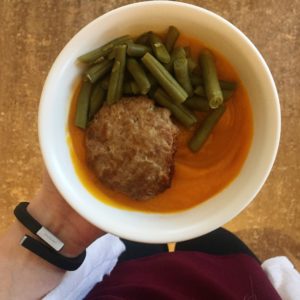College is a new and exciting experience for all, but taking care of yourself, staying caught up in school, and having a social life can be very difficult to balance with a chronic disease. Colleges can be very accommodating to your needs, but you must be proactive. Below are some tips for success in college with a chronic disease that I have gathered while battling Crohn’s disease and gastroparesis as a pre-medical and now medical student.
Register With the Office of Disabilities
Crohn’s disease, along with most other chronic illnesses, are technically disabilities. According to Section 504 of the Rehabilitation Act of 1973 and the Americans with Disabilities Act, any institution that receives government funding must provide reasonable accommodations and adaptations for students with disabilities that may affect their education. Most private schools will also make these accommodations, which may include access to a private/semi-private bathroom, single dorm room, ability to schedule classes at times of the day when your symptoms are better controlled, and test accommodations. These test accommodations may include the ability to reschedule exams in case of acute illness and stop-the-clock testing if you need to use the bathroom during the exam.
Talk to Your Professors
Explain to your professors that you have a chronic condition that may result in acute flare-ups. You may need to leave class urgently to run to the bathroom, miss class, or reschedule exams. I went to a small school, and my professors were very understanding, concerned, and eager to help me succeed in any way they could. For example, we took our final exams in a large gymnasium with at least 100 students in the room. I was flaring at the time and knew I would need to leave the exam a few times to use the bathroom. Instead of interrupting the other students taking their exams by opening the loud door several times, I asked if I could take the exam in my advisor’s office. My professor was completely okay with this, and I felt more comfortable being able to freely use the bathroom without interrupting anyone.

Stay on Top of Your Assignments
 You never know when a flare will hit, so do your best to keep up with your classes. Staying caught up and not procrastinating (as hard as it is) will reduce your stress when it comes to due dates and test preparedness. If you do end up flaring or getting sick, you will be in a better position academically to catch up.
You never know when a flare will hit, so do your best to keep up with your classes. Staying caught up and not procrastinating (as hard as it is) will reduce your stress when it comes to due dates and test preparedness. If you do end up flaring or getting sick, you will be in a better position academically to catch up.
Discuss your Diet with your School Nutritionist
Chances are, if you have Crohn’s disease or another chronic condition, you follow some kind of special diet. Contact your college’s Health Services for a special diet form that your doctor can fill out. You can meet with the school nutritionist who will point out the foods in the dining hall that you can eat. Oftentimes, the chefs can make you special meals. I had the option of texting the chef what I wanted to eat and what time I would be coming, and he would make me a special meal. Also, do not hesitate to ask the dining hall staff about ingredients, as meals may not be labeled well. Your health is more important than eating something that may contain an ingredient that will make you sick.

Defrost butternut squash soup & a turkey patty for a meal ready in 3 minutes!
Or, if you have your own kitchen, meal prep. Try to make enough food to last a few days at once, and you will not have to cook very often. If you freeze one meal every time you cook, pretty soon you will have a great frozen meal rotation. My mom is amazing and makes lots of soups, bone broth, chicken, and turkey patties that I freeze and can defrost for quick meals. Give my Citrus Ginger Chicken Stir-fry a try (AIP compliant, gluten free, dairy free, refined sugar free) if you’re looking for some meal prep ideas!

Citrus Ginger Chicken Stir-fry!
Look into Medical Housing
A certain number of rooms in every residence hall are usually reserved for students with medical housing. Talk to your school’s Health Services and Housing staff about the various housing options so you can feel comfortable living at school, stay well, and succeed academically. Most colleges can provide a private/semi-private bathroom so you do not have to run to a communal bathroom during painful episodes. Certain residence halls may even have access to a kitchen which is helpful if the dining hall does not accommodate your diet to your liking.
Find a Local Physician
If you attend school far away from your specialist, look for a doctor nearby. This local doctor should be able to work with your home doctor as a team. Be sure to transfer your prescriptions to a local pharmacy. Oftentimes, the pharmacy can deliver your medications to your college’s Health Services. Health Services can also perform routine blood work so you do not need to travel to a lab.
Focus on Self Care
Be sure to take care of yourself. Sleep, eat well, exercise, and do everything you can to keep your stress to a minimum. Look for a support group nearby if you find comfort in talking to others going through the same battles as you. Talk to your friends and roommates about your disease – good friends will be there for you, check in on you, and even drive you to your appointments. Your friends will understand if you are too fatigued to keep up with them, do not “party as hard,” or if you need to cancel or modify plans last minute. They may never truly understand what you go through, but they try, and that is all that matters.

College should be the most incredible four years of your life. You get to live with your friends, hang out with them 24/7, and learn in a supportive community. Crohn’s and other chronic diseases definitely complicate the college experience, but with plenty of self care, accommodations, and support from your friends, you will be successful, learn so much yourself, and have the best time of your life.


did you eat aip for gastroparesis and did it work?
I did. It is hard to know if it was diet, medicine, or a combination of both helped. But by completely avoiding any raw fruit/veggie, eating AIP, and treating the Crohn’s, my gastroparesis went away. I noticed slight improvement from erythromycin but what helped me the most was sticking to nutrient dense cooked foods, eating the majority of my calories earlier in the day, and walking after eating. I hope this helps